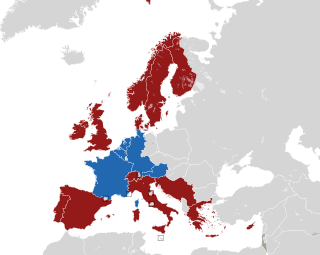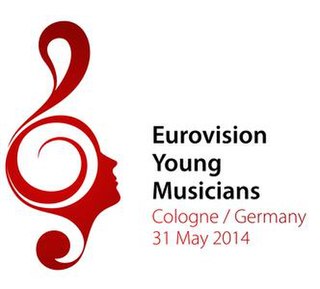
The European Broadcasting Union is an alliance of public service media organisations whose countries are within the European Broadcasting Area or who are members of the Council of Europe. As of 2024, it is made up of 123 member organisations from 56 countries, and 31 associate members from a further 20 countries. It was established in 1950, and has its administrative headquarters in Geneva.

The Eurovision Young Dancers 2001 was the eighth edition of the Eurovision Young Dancers, held at the Linbury Studio Theatre of the Royal Opera House in London, United Kingdom, between 18 and 23 June 2001. Organised by the European Broadcasting Union (EBU) and host broadcaster British Broadcasting Corporation (BBC), dancers from eleven countries participated in the televised final. A total of eighteen countries took part in the competition. Ireland and Ukraine made their début while Austria, Estonia and Norway returned. Hungary and Spain decided not to participate, along with France who broadcast the event.

The United Kingdom first participated in the Junior Eurovision Song Contest at the inaugural 2003 edition which took place in Copenhagen, Denmark. ITV, a member organisation of the United Kingdom Independent Broadcasting (UKIB) and the European Broadcasting Union (EBU), was responsible for the selection process of their participation from 2003 to 2005. The United Kingdom used a national selection format, broadcasting a show entitled Junior Eurovision Song Contest: The British Final, for their participation at the contests. The first representative to participate for the nation at the 2003 contest was Tom Morley with the song "My Song For The World", which finished in third place out of sixteen participating entries, achieving a score of one hundred and eighteen points. The United Kingdom withdrew from competing after the 2005 contest, but returned to the contest in 2022 in Yerevan, Armenia, with the British Broadcasting Corporation (BBC) replacing ITV as the country's broadcaster. The country withdrew again from the 2024 contest in Madrid.
Eurovision is a pan-European television telecommunications network owned and operated by the European Broadcasting Union (EBU). It was founded in 1954 in Geneva, Switzerland, and its first official transmission took place on 6 June 1954. However, a year before the official launch, on 2 June 1953 the coronation of Elizabeth II was one of the first events to be broadcast across Europe.

Eurovision Young Musicians, often shortened to EYM, or Young Musicians, is a biennial classical music competition for musicians aged between 12 and 21. It is organised by the European Broadcasting Union (EBU) between members of the union, who participate representing their countries. Some participating broadcasters hold national selections to choose its representative for the contest.

The Eurovision Young Musicians 1982 was the first edition of the Eurovision Young Musicians, a biennial event inspired by the success of the BBC Young Musician of the Year. The contest took place at the Free Trade Hall in Manchester, United Kingdom on 11 May 1982, and was organised by the European Broadcasting Union (EBU) and host broadcaster the British Broadcasting Corporation (BBC). Musicians from six participating countries took part in début contest, which was televised across the Eurovision Network. Humphrey Burton was the host of the contest and welcomed all of the participants in English, French, and German.

The Eurovision Young Musicians 1994 was the seventh edition of the Eurovision Young Musicians, held at the Philharmonic Concert Hall in Warsaw, Poland, between 9 and 14 June 1994. Organised by the European Broadcasting Union (EBU) and host broadcaster Telewizja Polska (TVP), musicians from eight countries participated in the televised final. A total of twenty-four countries took part in the competition therefore a semi-final was held in the same venue on 9 and 10 June 1994. Out of the 24 countries, 16 did not qualify to the final, including the host country Poland. All participants performed a classical piece of their choice accompanied by the Warsaw Symphony Orchestra, conducted by Kazimierz Kord.

The Eurovision Young Musicians 1990 was the fifth edition of the Eurovision Young Musicians, held at Musikverein in Vienna, Austria, on 29 May 1990. Organised by the European Broadcasting Union (EBU) and host broadcaster Österreichischer Rundfunk (ORF), musicians from five countries participated in the televised final. A total of eighteen countries took part in the competition. All participants performed a classical piece of their choice accompanied by the Austrian Radio Symphony Orchestra, conducted by Pinchas Steinberg. Greece and Portugal made their début at the 1990 contest.

The United Kingdom has participated in the Eurovision Song Contest 66 times. Its first participation was at the second contest, in 1957, and it has entered every year since 1959. The British participant broadcaster in the contest is the British Broadcasting Corporation (BBC). The country has won the contest five times: in 1967, with "Puppet on a String" performed by Sandie Shaw; in 1969, with "Boom Bang-a-Bang" by Lulu ; in 1976, with "Save Your Kisses for Me" by Brotherhood of Man; in 1981, with "Making Your Mind Up" by Bucks Fizz; and in 1997, with "Love Shine a Light" by Katrina and the Waves. The UK has also achieved a record sixteen second-place finishes, the first in 1959 and the most recent in 2022.

The Eurovision Young Musicians 2014 was the seventeenth edition of the Eurovision Young Musicians, held outside the Cologne Cathedral in Cologne, Germany, on 31 May 2014. Organised by the European Broadcasting Union (EBU) and host broadcaster Westdeutscher Rundfunk (WDR), musicians from fourteen countries participated in the televised final. This was the fifth time that the competition was held on an open-air stage. Germany previously hosted the contest in 2002.

Austria has participated in the biennial classical music competition Eurovision Young Musicians 19 times since its debut in 1982 and is the most successful country in the contest, with a total of six wins. Austria has hosted the contest a record six times, in 1990, 1998, 2006, 2008, 2010, and 2012.

Germany has officially participated in the biennial classical music competition Eurovision Young Musicians twenty times since its debut in 1982, winning the inaugural contest that year. Before German reunification in 1990, it was presented as West Germany, representing the Federal Republic of Germany. East Germany did not compete. Germany won again in 1996 and have hosted the contest twice, in 2002 and 2014.

Norway has participated in the biennial classical music competition Eurovision Young Musicians 19 times since its debut in 1982, winning the contest for the first time in 2012. Norway did not officially take part in 1984, the only contest the country has missed as of 2022. It hosted the contest in 2000 and did so again in 2024.

Sweden has participated in the biennial classical music competition Eurovision Young Musicians 15 times since its debut in 1986, winning the contest for the first time in 2006. Sweden are yet to host the contest.

France has participated in the biennial classical music competition Eurovision Young Musicians eleven times since its debut in 1982. France won the contest in 1986, and hosted the 2022 edition in Montpellier.

Spain has participated in the biennial classical music competition Eurovision Young Musicians eight times since its debut in 1988, most recently taking part in 2018, after a 16-year absence. The country's best result was a second-place finish in 1992, the only time in which they qualified for the televised final.

The United Kingdom has participated in the Eurovision Young Dancers 7 times since its debut in 1985, most recently taking part in 2005. The UK has hosted the contest once, in 2001 and jointly won the contest in 1989.

The Eurovision Young Musicians 2016 was the eighteenth edition of the Eurovision Young Musicians contest, which took place on 3 September 2016, outside the Cologne Cathedral, in Cologne, Germany. For a second consecutive time, German public broadcaster Westdeutscher Rundfunk (WDR) was the host broadcaster for the event, with Daniel Hope and Tamina Kallert being the presenters for the show. Musicians representing eleven countries with European Broadcasting Union (EBU) membership, participated in the contest, with San Marino making their debut, while Greece, Moldova, Netherlands, and Portugal decided not to participate in this edition. The candidates were accompanied by the WDR Symphony Orchestra Cologne, conducted by Clemens Schuldt. A five-person jury decided which of the participants would be awarded with the top-three prizes. Łukasz Dyczko of Poland won the contest, with Czech Republic and Austria placing second and third respectively.

The Eurovision Young Musicians 2018 was the 19th edition of the Eurovision Young Musicians contest. This edition was a co-production between the European Broadcasting Union (EBU), the Edinburgh International Festival, and the British Broadcasting Corporation (BBC) as host broadcaster. It was hosted in the United Kingdom, for the first time since the inaugural contest in 1982. Musicians representing eighteen countries participated in the contest, with Albania making their debut alongside seven returning countries, while Austria decided not to participate for the first time.
















